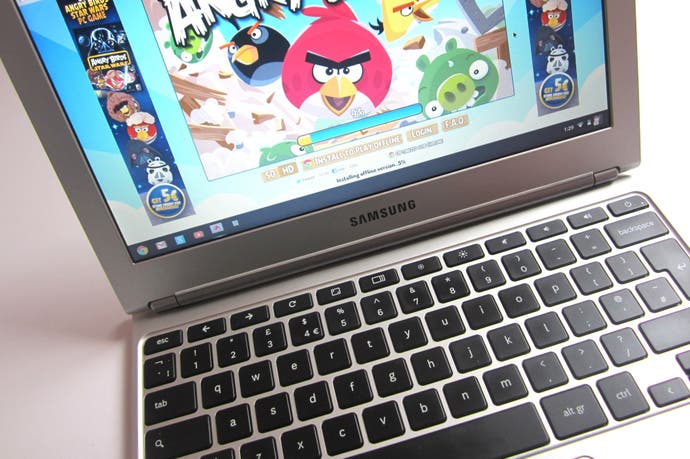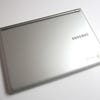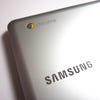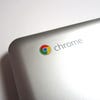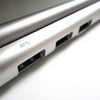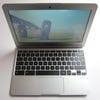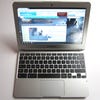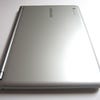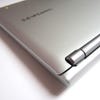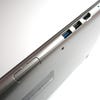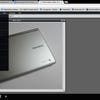Samsung Series 3 Chromebook review
Can this cloud-powered laptop replace your notebook or tablet? Digital Foundry investigates.
When Google announced its Chromebook concept back in May 2011, it was met with derision and scepticism from many sectors of the technology world. Early Chromebooks were running Google's bespoke Chrome OS were large, expensive and rendered useless when disconnected from the internet. However, the concept has evolved - and quickly. Samsung's Series 3 model, which launched at the end of 2012 and powered by the exact same processor found inside the Google Nexus 10 - is sleek, cheap and runs offline applications. After an awkward start, Google's new OS seems to be finding its feet, and may make you reconsider your next tablet or netbook purchase.
An initial glance at the Series 3 Chromebook illustrates why the latest hardware is attracting attention rather than gaining criticism. Clearly taking inspiration from Apple's iconic MacBook Air, the super-portable design is lightweight at 1.1kg and slips effortlessly into any average-sized backpack or satchel. The Air's metal casing is abandoned in favour of an entirely plastic frame - a given when you consider the low cost of just £229 - but everything feels robust and dependable.
The Series 3 Chromebook's keyboard also owes a debt to Apple's designers, and when placed alongside a MacBook Air it's genuinely difficult to distinguish between the two. Thankfully, this slavish imitation extends to the quality of the keys themselves; typing on the Series 3 Chromebook is a joy, although you'll have to get used to the lack of a caps lock key - it's been replaced by a "search" key in its stead, although you can change the function of this in the settings menu. The trackpad is another nod in Apple's direction; allowing two-touch input so you can right-click with a double-touch and scroll pages by making a two-fingered swiping gesture.
The device features a 11.6-inch 1366x768 screen with a 16:9 aspect ratio. Sadly, this proves to be one of the Series 3 Chromebook's biggest weaknesses; the quality of the matte LCD panel is lacking, with poor colour replication, brightness and contrast. Clearly this is one of the areas where Samsung has been forced to cut corners in order to achieve that affordable retail price.
Elsewhere, you'll find twin USB ports (one of which uses the new USB 3.0 standard), an SD card slot, a 3.5mm headphone socket and - if you've got the 3G model - a slot for your 3G-ready SIM card. There's also a 0.3 megapixel camera above the screen for video calls, as well as an ambient light sensor which dynamically adjusts the brightness of the screen based on the amount of light in the immediate environment. You can manually change the brightness using two keys, and the volume of the device's rather wimpy stereo speakers is similarly altered in this fashion.
Under the hood, the Series 3 Chromebook is powered by Samsung's own ARM-based Exynos 5 chipset, containing a dual-core 1.7GHz processor based on ARM's new A15 architecture. This CPU - combined with the solid-state storage of 16GB - means that the device is totally silent during use, with no need for a fan or any other cooling mechanism to keep things at a respectable temperature. Even after several hours of usage, the bottom of the Chromebook feels only slightly warm, rather than roasting hot.
While the presence of a dual-core CPU might suggest plenty of raw power, in practice it struggles to give the device the speed and smoothness it needs. If you're working in a single tab in the Chrome OS you'll have little cause for complaint, but as soon as you start multitasking and opening several different tabs, the whole user experience begins to stutter and stumble. Watching video - both online and locally - is rarely a seamless process and although you can stream music using the Google Music cloud storage service, you should expect skipping audio from time to time.
"This 11.6-inch Chromebook utilises the Exynos 5 dual chipset - good for Android tablets but sloth-like in this product when running multiple applications."
The whole Chromebook ethos is based on being online - the principle behind the OS is that you don't install applications on your device, but instead run them through the browser. If you're already deeply entrenched in Google's world and use Google Mail, Google Docs, Google Music and Google Calendar, moving to a Chromebook takes little effort. Once you've signed in with your Google profile everything syncs automatically - email, web bookmarks, calendar events and documents - and because there's no bulky OS to load up, the Series 3 Chromebook boots almost instantly from sleep mode and in around seven seconds from a standing start - the speed of which continues to surprise even after you've been using it for a few weeks.
Another pleasant surprise is just how much you can actually achieve even if you're not connected to the web. Google Docs now comes with a robust offline mode which stores documents on the Chromebook's internal memory, syncing with the online version when a wireless connection once again becomes available. There are several other activities work offline as well, including note-taking with the handy Scratchpad application.
Google's Chrome Store is packed with a surprisingly varied range of applications and these make the process of leaving your Windows or Mac-based laptop behind that little bit easier. Worried about photo editing? Apps like Pixlr Editor and Befunky Photo Editor offer much of the functionality of Adobe's Photoshop, and they're entirely free to download. Power users who prefer installing all kinds of custom Windows programs may find it hard going, and the lack of grunt from that dual-core CPU means that you're constantly hitting a performance ceiling - but if you do most of your work on the web and don't expect to do anything too demanding, the Chromebook makes sense.
Battery life is impressive for a device of this size; the 4080 mAh battery offers around six and a half hours of use on a full charge, but disabling WiFi stretches that figure to around eight hours. That makes the Chromebook a useful travelling companion, especially for business trips - on a full charge you could potentially get plenty of use in a day without having to worry about carrying around your power supply.
"Game performance is sub-optimal compared to iOS and Android and many of the available games for Chrome OS simply don't run at all."
From a gaming perspective, the Series 3 Chromebook presents a tantalising proposition - a laptop device that costs less than the price of an iPod Touch and is connected to the rapidly-expanding Chrome Store. The reality is rather less appealing. While it's true that there are plenty of games available on the Chrome Store - including big-hitters like Bastion, AirMech and From Dust - none of these run on the device. What you're left with is a range of 2D titles such as Angry Birds, Canvas Rider and Gravity Duck - most of which are browser-based versions which run on a page surrounded by adverts.
Compared to the general level of performance on an entry-level laptop (in our case, the test subject was a Compaq Presario C700, with a dual-core Intel Pentium processor and poor integrated graphics), the Chromebook is noticeably lacking, and there's quite a gulf in smoothness and speed, with games like Angry Birds running in a smaller-than-usual window and plagued with a skittish frame rate (it's a locked 60FPS on most modern mobile devices). However, basic 2D titles such as Bejeweled and Dragons of Atlantis remain perfectly playable, despite the drop in performance.
If you're looking for a cheap and portable way to enjoy Flash-based browser games, there's little reason to grumble, but we can't imagine many gamers will view the Chromebook as a viable platform when it is so restricted in what it can and can't play. It's a genuine shame that the Chromebook isn't more adept in this area; the aforementioned AirMech - a modern-day homage to the Sega Mega Drive classic Herzog Zwei - would almost have been worth the price of purchase alone, had it been compatible. It's a real shame, particularly as the exact same chipset runs so many Android titles on the Google Nexus 10 with a greater level of performance.
Samsung Chromebook: the Digital Foundry verdict
Google's Chromebook concept has seen its fair share of negative press, but the Series 3 model comes very close to vindicating the company's faith in cloud-based computing. Unfortunately it lacks power and could really do with a better quality screen while its gaming credentials are dire. However, for the £229 asking price, it's worth consideration. It's portable, attractive, has excellent stamina and - if you're already locked into Google's cloud-based vision on your current computer or smartphone - it makes almost perfect sense, especially if your computing demands are modest.
The Series 3 therefore get a guarded thumbs-up, although it's impossible not to yearn for a more satisfying gaming experience; had Samsung been able to supply this, this unique laptop would come with a more passionate recommendation. Lightweight, attractive, packed with staying power and more than capable of replacing your laptop or netbook, this affordable device could also end up stealing time away from your iPad or Android tablet.
